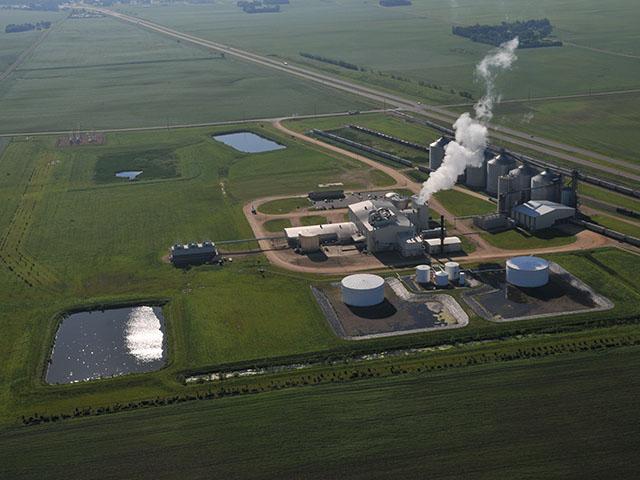Battle for Lost RFS Gallons
Ag, Biofuels Groups Continue to Fight for 500 Million Gallons of Ethanol Removed From RFS
OMAHA (DTN) -- Biofuels and agriculture groups fired back in response to a petroleum group's legal argument that they have no right to have 500 million gallons restored to the Renewable Fuel Standard, in a reply filed by the groups on Thursday in the U.S. Court of Appeals for the District of Columbia Circuit.
In 2017, the court ruled EPA had illegally waived the gallons from the 2016 RFS renewable volume obligations and required the agency to restore them, which EPA has not yet done.
A coalition of agriculture and biofuel groups asked the federal appeals court to order the EPA to restore those waived gallons.
The American Fuel and Petrochemical Manufacturers said in a motion filed with the court in recent weeks that EPA should be allowed additional time to decide how to handle the court's original order.
Growth Energy, Renewable Fuels Association, National Biodiesel Board, American Coalition for Ethanol, National Corn Growers Association, National Farmers Union, and National Sorghum Producers argued on Thursday that EPA has had ample time to respond.
"EPA claims that three-plus-years' delay is reasonable because it has been giving 'careful consideration' to 'the myriad complexities involved in addressing the court's mandate,'" the groups argued this week.
"These 'complexities' are makeweight, reflecting EPA's mistaken view that its task on remand is not only to account for the court's mandate but also to 'mitigate any retroactive effects of issuing' a curative obligation and 'reconcile these considerations with the realities of the renewable fuel market.' EPA's true task is simple: restore the 2016 total requirement to the level it would have been absent the unlawful waiver."
P[L1] D[0x0] M[300x250] OOP[F] ADUNIT[] T[]
American Fuel and Petrochemical Manufacturers said in its recent court motion the court's original ruling in 2017 does not "mandate a particular outcome" by EPA on remand.
In EPA's 2020 RFS volume rule, the agency proposed a response to the court's mandate in the 2017 case.
The biofuels and agriculture groups said in their reply EPA's "only authority is to correct its error. Obligated parties have no protected interest in avoiding a supposed 'burden' that Congress intended them to bear and that this court concluded EPA had unlawfully relieved."
During the past several months the agency has cited difficulties created by the COVID-19 pandemic as one reason for the delay.
"EPA also invokes pandemic disruptions," the groups said, "but those did not begin until after EPA's promised action in 'early 2020' -- and after about two-and-a-half years had passed since the mandate."
AFPM also argued in its recent court filing difficulties with the ethanol blendwall -- or when total ethanol production exceeds the E10 market -- is a reason for EPA not to remand the 500 million gallons.
"Most absurd is AFPM's assertion that on remand, EPA 'must reckon with the ethanol blendwall' -- the very factor that ACE (court ruling) held EPA improperly considered in granting the unlawful 2016 waiver," the groups argue.
The groups have asked the court to require EPA to act within six months after a court order and to require obligated parties to show compliance within three months after EPA would issue a curative obligation.
In the July 2017 ruling in Americans for Clean Energy v. EPA, the court invalidated the EPA's improper waiver of 500 million gallons in the 2016 RVO and ordered EPA to revisit the rule.
In its ruling, the court held EPA's interpretation of an inadequate-domestic-supply waiver provision "runs contrary to how the Renewable Fuel Program is supposed to work."
A few months after the court's 2017 decision, the ag and biofuels lawsuit said, EPA acknowledged the "importance of implementing the court's mandate."
EPA's 2018 RVO rule stated there was "considerable uncertainty" about the number of available RINs because of "the possible impact of an action to address the remand in ACE."
One month later, EPA issued a notice acknowledging "some uncertainty" about available RINs "in light of the fact that the EPA has not yet indicated its intentions with respect to responding to the remand," according to the lawsuit.
In 2019, the groups urged EPA to "immediately address the D.C. Circuit's vacatur of EPA's general waiver of the 2016 total volume requirement," pointing out the agency could "easily remedy the vacatur by adding the 500 million RINs covered by the vacated general waiver to the total 2019 volume requirement."
Todd Neeley can be reached at todd.neeley@dtn.com
Follow him on Twitter @toddneeleyDTN
(c) Copyright 2021 DTN, LLC. All rights reserved.




